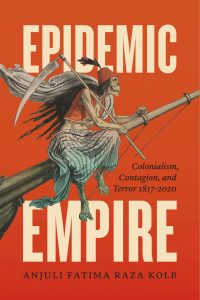In Epidemic Empire: Colonialism, Contagion, and Terror, 1817-2020, Anjuli Fatima Raza Kolb examines the works of major writers in the colonial-postcolonial literary canon to explore the Global North’s reliance on contagion metaphors to imagine and manage anticolonial rebellion. This book serves as important reading for scholars interested in the racialisation of Muslims, the ‘War on Terror’ and the sociology of health and illness, writes Tarek Younis.
Epidemic Empire: Colonialism, Contagion, and Terror, 1817-2020. Anjuli Fatima Raza Kolb. University of Chicago Press. 2021.
 Find this book (affiliate link):
Find this book (affiliate link):![]()
The timing of Anjuli Fatima Raza Kolb’s Epidemic Empire is opportune, not just because her discussion of epidemics strikes a chord in our post-COVID era. Rather, it is the book’s ability to communicate the significance of epidemics for national security, exposing that thin line which divides the virus in the body from the body as a virus.
Certainly, some bodies are conceived of as viruses more than others. From various colonial administrations across history to the contemporary ‘War on Terror’, Raza Kolb traces the Global North’s reliance on illness metaphors in making sense of and managing racialised (post-)colonial subjects. Epidemics play a central rhetorical device in this regard. And while contemporary security practices are replete with medical metaphors, Raza Kolb charts their legacy across (post-)colonial history.
Raza Kolb draws significantly on Edward Said’s mode of recognising Orientalism’s discursive construction of Islam and Muslims as regressive, savage and — as central to the book — toxic. Epidemic Empire thus draws primarily on written texts and literary works to build a convincing argument about the historical significance of illness metaphors.

Image Credit: Record-type hypodermic syringe, London, England, 1930-1960. Credit: Science Museum, London. Attribution 4.0 International (CC BY 4.0)
The first chapter provides a concise overview of the epidemiological model underlying the ‘War on Terror’. Here Raza Kolb discusses political discourse which likens the nation’s health security to that of a body. The chapter serves as an excellent introductory text on the primacy of illness metaphors underlying security practices, irrespective of the reader’s own discipline.
The book is then divided into three parts. Part One charts the role of colonial science and public health campaigns in the nineteenth-century British imperial project. It draws on early epidemiological literature, such as Rudyard Kipling’s novel Kim and Bram Stoker’s Dracula, to outline the management of Muslim revolt and resistance through racialised depictions of contagion. Part Two looks at Algeria and the epidemiological framings of anti-colonial struggles through the works of Albert Camus, Frantz Fanon and Djamila Boupacha. Part Three takes a post-colonial turn to the biopolitics of security, looking, for example, at the writings of Salman Rushdie and the 9/11 Commission.
The book’s achievement lies in its multifaceted study of health as a meaning system. This meaning system is not new, but its historical legacy in colonial and post-colonial projects is substantial. While the contributions of Epidemic Empire are many, I will briefly highlight two.
The first is to consider illness metaphors as fundamental in the process of depoliticising popular revolts and anti-colonial movements and anchoring them as phenomena primarily associated with security. As Raza Kolb notes, ‘such [epidemiological] depictions of popular revolt, eviscerated of popular content and deaf to the demands of those who cry loudly and continually for freedom, are kept quarantined outside of a concept of just war, thereby expanding further grounding theories and legal definitions of terrorism as a particularly virulent species of nonstate or antistate violence‘ (211, my emphasis). In other words, given the non-legitimacy of revolts, these are seen as contagions infecting otherwise docile populations.
Illness metaphors also reify the West as healthy in contrast to the morbidly ill, post-colonial Muslim world — a world incessantly infected by rampant violence. As Raza Kolb argues, the symbols of cancer, plagues and epidemics associated with Muslim violence reinforce a clash of civilisations — the liberal West vs illiberal Muslim lands — through the poetics of disease. This is further illustrated in works like Rushdie’s memoir Joseph Anton, where he foresees that ‘the fanatical cancer spreading through Muslim communities […] would, in the end, explode into the wider world’ (214, citing Rushdie). The significance of Rushdie’s writing is not only its content, but in his shift towards virology, coinciding with the rhetoric of the global ‘War on Terror’.
As I have also argued, metaphors of viruses and disease play a significant role in rendering colorblind racist strategies like the ‘War on Terror’ (Younis, 2020). Colorblindness obscures the centrality of race in the liberal pursuit of not appearing racist. The language of disease does well in this process, rendering issues racialised to particular groups (terrorism, gangs, illegal immigrants, etc) as phenomena belonging to human vulnerability — as though not targeting particular racialised groups. In other words, illness metaphors play a central role in maintaining the post-racial facade of modern secular-liberal societies.
As a second contribution, Epidemic Empire draws attention to a more subtle but necessary process: not just the prevalence of illness metaphors, but their importance in governance. Epidemics unveil a state’s anxiety to maintain control — as do rebellions. Unsurprisingly then, as Raza Kolb argues, there is a reciprocity between discourses of sanitation and health seeking to manage outbreaks of disease and Orientalist discourses seeking to manage outbreaks of rebellions and insurgencies.
Much has already been written on contemporary counterterrorism as a continuation of empirical counterinsurgency. Today, non-violent extremism is increasingly pivoted as a public health issue. The rise in fascism across the Global North is framed as a virus spreading across otherwise freedom-loving, democratic landscapes, infecting vulnerable white majority populations with racism, xenophobia and nativism. But as Raza Kolb demonstrates, the contagion metaphor is a cultural artefact, coded within literature and full of political importance. In other words, contagion’s symbolic prominence in national security is not new.
Epidemic Empire is not focused on the role of health in governance and biopolitics (here readers may be interested in Nikolas Rose’s books, such as The Politics of Life Itself (2007)). Rather, Raza Kolb’s wonderful contribution to the field is specifically in showing how racialised notions of threat are conveyed through metaphors of health and illness, as inscribed within (post-)colonial legacies. The book maintains a critical and enlightening perspective throughout and serves as important reading for scholars interested in the racialisation of Muslims, the ‘War on Terror’ and the sociology of health and illness.
Note: This review gives the views of the author, and not the position of the LSE Review of Books blog, or of the London School of Economics and Political Science. The LSE RB blog may receive a small commission if you choose to make a purchase through the above Amazon affiliate link. This is entirely independent of the coverage of the book on LSE Review of Books.






